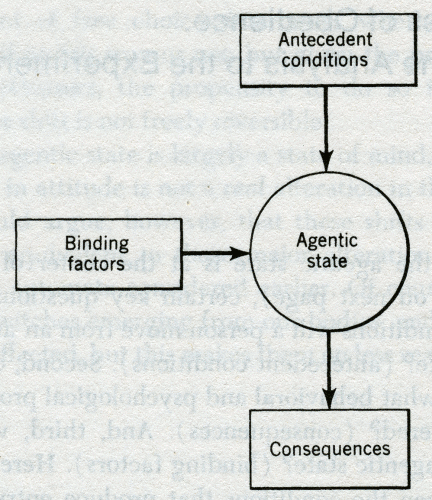
- •1. The Dilemma of Obedience
- •2. Method of Inquiry
- •Interview and Debriefing
- •3. Expected Behavior
- •4. Closeness of the Victim
- •5. Individuals Confront Authority
- •6. Further Variations and Controls
- •7. Individuals Confront Authority II
- •8. Role Permutations
- •9. Group Effects
- •10. Why Obedience? -- An Analysis
- •Variability
- •11. The Process of Obedience: Applying the Analysis to the Experiment
- •Institutional Setting
- •Immediate Antecedent Conditions
- •12. Strain and Disobedience
- •13. An Alternative Theory: Is Aggression the Key?
- •15. Epilogue
11. The Process of Obedience: Applying the Analysis to the Experiment
Now that the agentic state is at the center of our analysis (diagrammed on next page), certain key questions arise. First, under what conditions will a person move from an autonomous to an agentic state? (antecedent conditions). Second, once the shift has occurred, what behavioral and psychological properties of the person are altered? (consequences). And, third, what keeps a person in the agentic state? (binding factors). Here a distinction is made between the conditions that produce entry into a state and those that maintain it. Let us now consider the process in detail.
Antecedent Conditions of Obedience
First, we need to consider forces that acted on the person before he became our subject, forces that shaped his basic orientation to the social world and laid the groundwork for obedience.
Family
The subject has grown up in the midst of structures of authority. From his very first years, he was exposed to parental regulation, whereby a sense of respect for adult authority was inculcated. Parental injunctions are also the source of moral imperatives. However, when a parent instructs a child to follow a moral injunction, he is, in fact, doing two things. First, he presents a specific ethical content to be followed. Second, he trains the child to comply with authoritative injunctions per se. Thus, when a parent says, “Don’t strike smaller children,” he provides not one imperative but two. The first concerns the manner in which the recipient of the command is to treat smaller children (the prototype of those who are helpless and innocent) the second and implicit imperative is, “And obey me!” Thus, the very genesis of our moral ideals is inseparable from the inculcation of an obedient attitude. Moreover, the demand for obedience remains the only consistent element across a variety of specific commands, and thus tends to acquire a prepotent strength relative to any particular moral content. [11]

|
"There is one characteristic of the present direction of public opinion, peculiarly calculated to make it intolerant of any marked demonstration of individuality. The general average of mankind are not only moderate in intellect, but also moderate in inclinations: they have no tastes or wishes strong enough to incline them to do anything unusual, and they consequently do not understand those who have, and class all such with the wild and intemperate whom they are accustomed to look down upon. Now, in addition to this fact which is general, we have only to suppose that a strong movement has set in towards the improvement of morals, and it is evident what we have to expect. In these days such a movement has set in; much has actually been effected in the way of increased regularity of conduct, and discouragement of excesses; and there is a philanthropic spirit abroad, for the exercise of which there is no more inviting field than the moral and prudential improvement of our fellow-creatures. These tendencies of the times cause the public to be more disposed than at most former periods to prescribe general rules of conduct, and endeavor to make every one conform to the approved standard. And that standard, express or tacit, is to desire nothing strongly. Its ideal of character is to be without any marked character; to maim by compression, like a Chinese lady's foot, every part of human nature which stands out prominently, and tends to make the person markedly dissimilar in outline to commonplace humanity. As is usually the case with ideals which exclude one half of what is desirable, the present standard of approbation produces only an inferior imitation of the other half. Instead of great energies guided by vigorous reason, and strong feelings strongly controlled by a conscientious will, its result is weak feelings and weak energies, which therefore can be kept in outward conformity to rule without any strength either of will or of reason. Already energetic characters on any large scale are becoming merely traditional. There is now scarcely any outlet for energy in this country except business. The energy expended in that may still be regarded as considerable. What little is left from that employment, is expended on some hobby; which may be a useful, even a philanthropic hobby, but is always some one thing, and generally a thing of small dimensions. The greatness of England is now all collective: individually small, we only appear capable of anything great by our habit of combining; and with this our moral and religious philanthropists are perfectly contented. But it was men of another stamp than this that made England what it has been; and men of another stamp will be needed to prevent its decline." -- John Stuart Mill, "On Liberty" |
